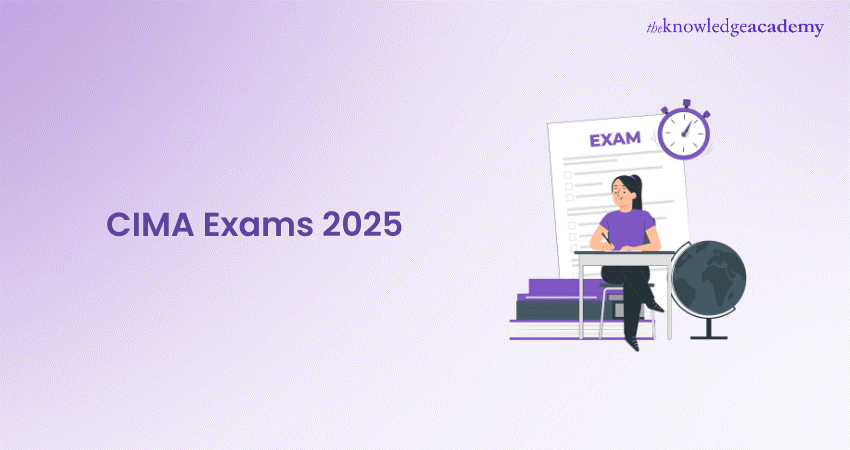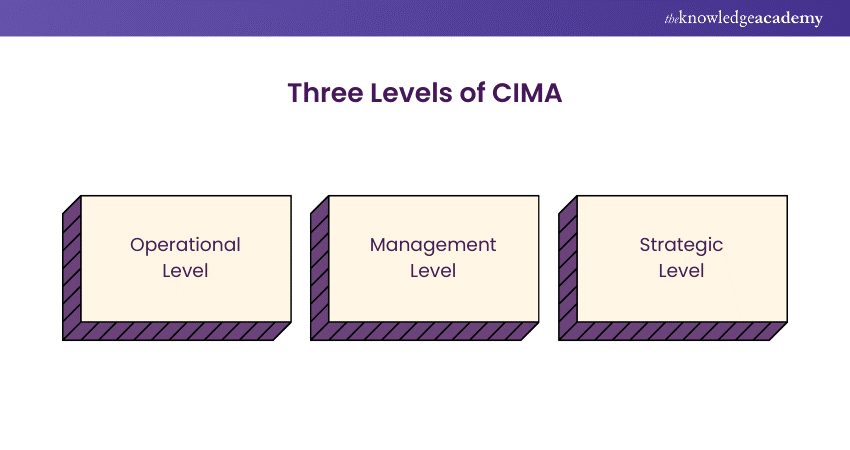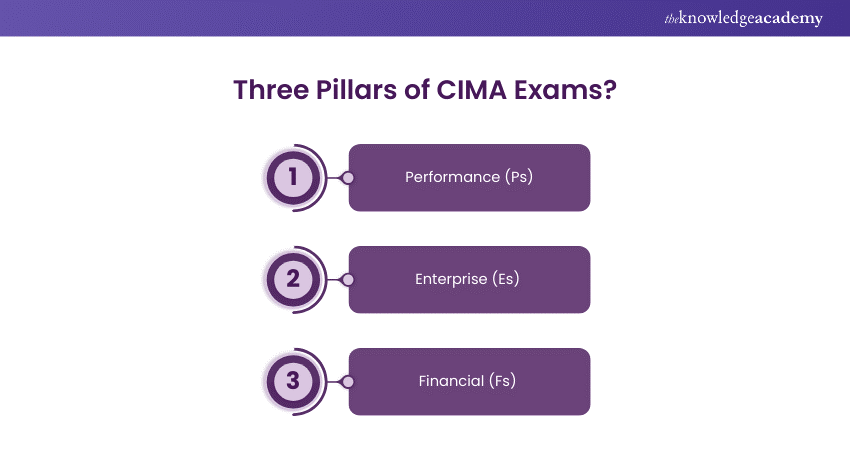We may not have the course you’re looking for. If you enquire or give us a call on 01344203999 and speak to our training experts, we may still be able to help with your training requirements.
We ensure quality, budget-alignment, and timely delivery by our expert instructors.

Imagine transforming your finance career with skills that go beyond Traditional Accounting. CIMA Exams are a gateway to mastering Management Accounting, blending financial insight with strategic thinking. These exams don’t just test your knowledge. They prepare you for real business challenges, from budgeting to risk management.
Each level builds your expertise, focusing on the skills companies need in leaders today. CIMA is more than a qualification. It’s a journey to becoming a trusted advisor in the finance world. If you’re ready to move beyond the basics and shape business strategy, CIMA Exams are the path forward.
Table of Contents
1) The CIMA Exam Structure
2) CIMA Exam Format
3) What are the Three pillars of CIMA Exams?
4) Strategies To Use Before the Exam
5) Strategies To Use During the Exam
6) Pros and Cons of One CIMA Subject
7) Conclusion
The CIMA Exam Structure
The Chartered Institute of Management Accountants (CIMA) offers a structured pathway to becoming a Chartered Global Management Accountant (CGMA). However, those with an MBA or Master’s Degree in Accounting can take the CIMA Masters Gateway Exam. Passing this exam allows them to skip the first two levels and go straight to the Strategic level.
This fast-track option has the lowest pass rate among CIMA Exams, so it requires dedication. For those not taking the fast-track route, the CIMA qualification is completed in three levels: Operational, Management, and Strategic. Each level comprises three Objective Tests and one Case Study exam, totalling 12 assessments.
Levels and Components:

1) Operational Level:
This is the first level, focusing on entry-level accounting and financial tasks. Candidates learn how to implement strategies, prepare financial statements, and support business decisions with Management Accounting data. Passing this level will award the CIMA Diploma in Management Accounting.
a) Objective Tests:
1) E1: Managing Finance in a Digital World
2) P1: Management Accounting
3) F1: Financial Reporting
b) Case Study Exam:
Integrates knowledge from the Objective Tests to assess practical application.
Management Level:
The second level covers managerial skills, linking strategy to practical execution. Candidates learn about monitoring, reporting, managing projects, setting prices, and handling relationships. Completion of this level grants the CIMA Advanced Diploma in Management Accounting.
1) Objective Tests:
a) E2: Managing Performance
b) P2: Advanced Management Accounting
c) F2: Advanced Financial Reporting
2) Case Study Exam:
Evaluates the ability to apply concepts in a managerial context.
Strategic Level:
This final level prepares candidates for senior management roles. It focuses on making strategic decisions, developing financial strategies, managing risk, and setting frameworks for business operations. After passing the Strategic level, candidates are eligible to submit their professional experience to complete the full CIMA qualification.
1) Objective Tests:
a) E3: Strategic Management
b) P3: Risk Management
c) F3: Financial Strategy
2) Case Study Exam:
Assesses strategic decision-making and leadership skills.
CIMA Exam Format
The CIMA Exam Format is designed to test both technical skills and practical applications. It includes Objective Tests for specific subjects and Case Study Exams that assess real-world problem-solving abilities.
Each part of the exam format is designed to build and test the skills needed in Management Accounting, preparing candidates for strategic roles in business.
Objective Tests
a) Duration: 90 minutes
b) Format: Computer-based, multiple-choice questions
c) Availability: On-demand throughout the year
Case Study Exam
a) Duration: 3 hours
b) Format: Computer-based, scenario-based questions requiring written responses
c) Availability: Four windows annually (February, May, August, November)
Progression through the levels is sequential; candidates must pass all assessments at one level before advancing to the next. This structured approach ensures a great understanding of Management Accounting principles and their practical application.
What are the Three Pillars of CIMA Exams?
The CIMA Exams are built on three pillars, each covering a key area in Management Accounting. These pillars ensure candidates develop a well-rounded skill set for business success.

a) Performance (Ps)
The Performance pillar focuses on Management Accounting. It teaches candidates how to use financial data to make effective business decisions, manage costs, and improve efficiency.
b) Enterprise (Es)
The Enterprise pillar develops skills for managing business operations and strategic planning. Candidates learn about organisational behaviour, project management, and how to drive business growth.
c) Financial (Fs)
The Financial pillar is all about financial reporting and control. It covers areas like financial accounting, tax, and risk management, equipping candidates to analyse financial information and ensure compliance.
Strategies to Use Before the Exam
Set a clear learning goal and dedicate time to specific sections of the course. After completing each section, take a practice exam to evaluate your understanding and identify any weak areas that need more focus.
a) Follow a Study Plan
Set a clear learning goal and dedicate time to specific sections of the course. After completing each section, take a practice exam to evaluate your understanding and identify any weak areas that need more focus.
b) Time Management is the Key
Take several practice exams to get comfortable with exam-style questions. It helps improve your time management skills before the actual exam.
c) Choose What Suits You the Best
Studying effectively is better than studying longer. Explore different study methods and find the one that works best for you. Stick with the approach that helps you learn consistently.
Strategies to Use During the Exam
When taking the CIMA Exam, having a solid strategy can make a big difference. Knowing how to use your time and approach each question thoughtfully can boost your confidence and improve your performance. Here are some effective strategies to keep in mind during the exam.
Understand First, Answer Later
Always read each question carefully to ensure you fully understand it. Adding unrelated information won’t earn any credit, so focus on what’s asked.
Use Your Reading Time Intelligently
You have 20 minutes of reading time before the exam begins. While you can’t open the answer book or write, you can study the question paper and plan your approach to the exam.
Manage Your Time
Avoid spending too much time on one question. Plan your time in advance based on each question's credit value. If a question takes too long, move on and return to it later if you have time.
Offer a Structured Response
Give clear, organised responses with relevant information. Make it a habit to review your answers to ensure you’ve addressed each question completely.
Pros and Cons of One CIMA Subject
CIMA offers the flexibility to take one or multiple subjects at a time, each approach having its own pros and cons.
Advantages of Taking One Subject at a Time
a) You can focus more on each subject individually.
b) You’re able to take the exam as soon as you feel ready.
c) Managing time becomes easier, which is helpful if you have other commitments like work or family.
Disadvantages of Taking One Subject at a Time
a) You may need to refresh your knowledge before the case study exam.
b) Completing all three objective tests for each level may take longer.
c) Connections between subjects in the syllabus may not be as clear.
The advantage of CIMA’s approach is that you can take one subject at a time. This allows you to focus deeply on each topic without getting mixed up with others, such as strategic or financial subjects. For many, studying one subject at a time increases the chance of success by avoiding an overload.
Conclusion
The CIMA vs ACCA debate is crucial for aspiring finance professionals, and the CIMA Exams serve as a valuable step for those looking to advance in Management Accounting. These exams cover essential skills in finance, strategy, and decision-making. Successfully passing them can open doors to leadership roles in finance. With dedication and preparation, the CIMA qualification can significantly elevate your career.
Frequently Asked Questions
Which Country Pays the Highest Salary for CIMA?

The UK often offers the highest salaries for CIMA-qualified professionals, with roles in London and other major cities providing competitive pay, especially in finance and consulting. However, the UAE, Hong Kong, and the USA also offer high salaries due to the demand for management accountants.
Is CIMA Better Than CMA?

CIMA and CMA are both respected, but they serve different career paths. CIMA focuses on Management Accounting and strategic roles, while CMA emphasises financial management and decision-making. CIMA is better for those aiming for strategic, global roles, while CMA is ideal for financial analysis and internal management.
What are the Other Resources and Offers Provided by The Knowledge Academy?

The Knowledge Academy takes global learning to new heights, offering over 3,000 online courses across 490+ locations in 190+ countries. This expansive reach ensures accessibility and convenience for learners worldwide.
Alongside our diverse Online Course Catalogue, encompassing 19 major categories, we go the extra mile by providing a plethora of free educational Online Resources like News updates, Blogs, videos, webinars, and interview questions. Tailoring learning experiences further, professionals can maximise value with customisable Course Bundles of TKA.
What is The Knowledge Pass, and How Does it Work?

The Knowledge Academy’s Knowledge Pass, a prepaid voucher, adds another layer of flexibility, allowing course bookings over a 12-month period. Join us on a journey where education knows no bounds.






 Top Rated Course
Top Rated Course



 If you wish to make any changes to your course, please
If you wish to make any changes to your course, please


